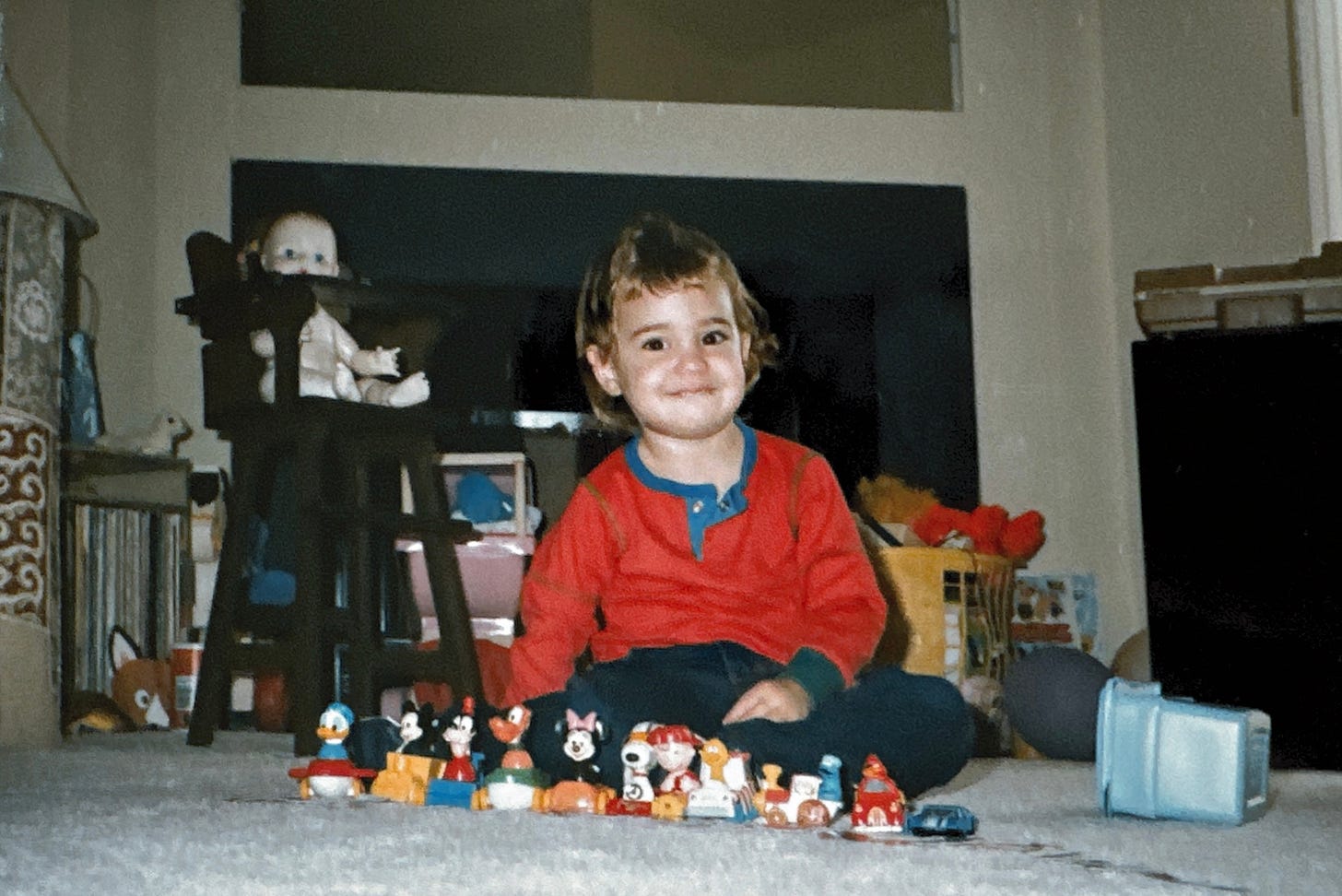“Perfect is boring.”
My mom recited this statement ad nauseam. It’s a mantra that still echoes inside of me.
I repeat it to Abigail when she writes a 5 instead of a 2 and slams her pencil down. Or when she runs out of line space and her big blocky letters dangle down the margin of the page.
“You know what we say in this family: perfect is ______.”
“BORING!” She answers with gusto.
My mom had a million iterations on this theme. She frequently used the acronym “PP” as shorthand for the phrase “Practically Perfect in Every Way,” from Mary Poppins.
As a child, I’d get distressed by holes in my leggings or a spelling mistake on my picture or by not collecting every single Muppet Baby in the McDonald’s Happy Meals collection (“How can I play Muppet Babies without Kermit!?”)
And now as a parent, it’s wild to see how much personality is already baked into your children. How different their wiring can be from your own, even with the same raw ingredients. I was wired to line up my toys in a row and carefully place each colorform in the exact right spot. I treated my objects with care, like they were priceless heirlooms instead of plastic crap from goody bags.
Over time my mom’s “Perfect is boring” somehow evolved into “Good enough, better than most.” Usually she’d say this after a glass of wine, arranging some defrosted Trader Joe’s appetizers on a chipped white plate for a family dinner. This sentence would send my body into hives. I found the sentiment utterly depressing. The expression may as well have been, “Just give up.”
I carried my perfectionism into young adulthood. Whether I was hosting a small party and looking for the perfect cheese board platter or schlepping my travel steamer on vacation to coax the wrinkles out of a sun dress, I knew things could always be a bit better: I could always be thinner. The centerpiece could always be fuller. The experience could always be more memorable.
How was I supposed to sleep knowing that something was fine, but not ideal? What would it say about me? Would my friends leave my house thinking, “Wow, Elyse didn’t even have proper champagne flutes…what a slob!”
What’s more; I knew this “quirk” was super obnoxious and un-fun to everyone else, so I felt compelled to mask it - adding to the anxiety surrounding it.
At work I got rewarded for my perfectionism. Finding a flaw in a layout - a Pantone color slightly-off or a word misplaced - every single component of creating a campaign or TV commercial or website should be (and had to be) “perfect.” So in a way, I was honing my ability to find flaws throughout my career. I’d been brainwashed by the ad industry to believe that “good is the enemy of great,” and here was this amazing woman - my mother - whom I admired and adored telling me that good was totally fine. Which was it? What was “good enough?” When was it time to leave something alone and take a damn nap?
A few years ago, I asked my mom what her whole “Perfect is boring” obsession was about. I asked if it was something she frequently uttered because it was a reminder to herself or if it was a custom-made message just for me.
She told me that while she worried about a lot of stuff, she never worried about being perfect. But she noticed these strong tendencies in me as a child and worried my perfectionism would consume me. She decided to repeat the, “Perfect is boring” message again and again because she knew how dangerous it could be after watching her friends’ kids (aka high-achieving daughters) cope with anorexia and anxiety and make themselves sick to get a 1600 on their SATs. She didn’t want that for me. So she positioned perfectionism as something to avoid vs attain. She told me it was impossible. A trap. That it wasn’t achievable and even if it were, how boring a life would that be? She’d point out the beauty in imperfect homes or the character and charm of experiences that weren’t “perfect” by Martha Stewart standards.
And she walked the walk. She wore orthopedic sneakers that were comfortable. She didn’t obsess over her weight or calories. Her clothes hangers were always different and messy (Joan Crawford could never). She always sang even though she knew she couldn’t carry a tune. She said she didn’t give a shit about being perfect - she already knew she would never be the perfect mom or housewife or human. And she had made peace with that. So she complimented my sister and me on the effort and creativity of our problem solving, not on a flawless execution. I never had pressure put on me to get all As, and honestly received equal praise for a B- as I did an A+.
And still - despite ALLLLLL that early childhood programming and affirming, it still feels Herculean to swim against the current of my perfectionistic instincts. I have to constantly remind myself that I’m enough - my work, my looks, my love - the way I show up in the world and for the people I care about.
I also have a few tricks and tools to lean on, like:
The Perfectionist’s Guide to Losing Control, by Katherine Morgan Schafler
Talking to my friends and family
Not weighing myself or counting my steps/workouts (and donating clothes that don’t fit or feel great)
Making a list of the things I like about myself
The Gifts of Imperfection, by Brené Brown
Unplugging from social media
Changing my media diet in general (unfollowing the Perfect Moms on IG)
Therapy
Setting more reasonable goals
Being aware of my internal monologue and self-talk
Perfectionism and “enoughness” will always be a core wound for me. I’ll always be hyper-aware of (and sensitive to) my mistakes / typos / failures. But it’s never been more important to demonstrate what is and is not important - because Abigail and Pippa are watching me and I don’t want them to think I am judging their worthiness or measuring them against some idealistic future version of themselves. Because I’m not. I’m loving them for their full humanity, for their nose-picking and crooked teeth and deep laughter, the way I believe my mom loved my sister and me for ours.









